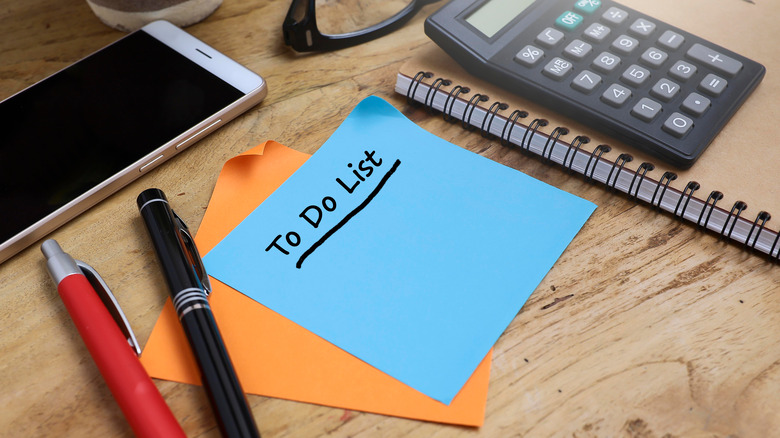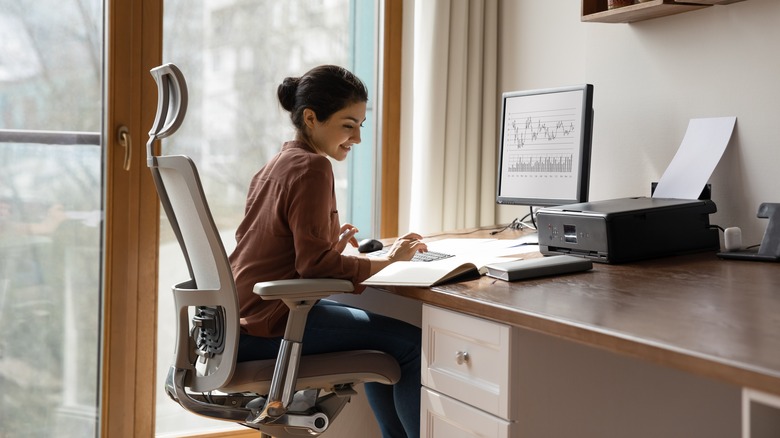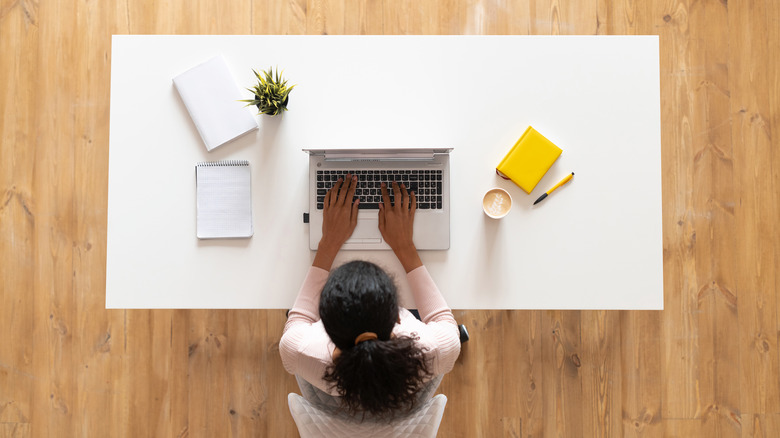An Expert Explains How To Set Up Your Home Office For Maximum Focus - Exclusive
When given a choice between working in an office and having the option of doing so from home, most employees would choose the latter, according to a study from Stanford University. To that end, with more and more people finding ways to work remotely — either with the help of their current employers or if they run a business on their own — it's essential to have a home office set up that allows you to focus. There is much to be said for increased productivity because of familiar surroundings and fewer office distractions — not to mention the time and money that can be saved when folks are not forced to travel to their place of employment, or dole out money on food expenses.
That's why it helps to have an office that is designed to allow you to get the most out of your workday. But how do you go about setting things up correctly? In an exclusive interview with House Digest, professional designer and founder of Jen Dallas Interiors, Jen Dallas, filled us in on the ways you can set up your home office so that you can be more focused. Let's take a look at some of her helpful tips.
Keep your space clear of home duties
Although every person works differently, it can be very beneficial to have a clear separation between your domestic duties and your work commitments. Having a defined space as well as set home office hours can allow you to be more productive and keep your mind focused during your working day. To aid in this separation, Jen Dallas has some advice. "Organize your desk to be set for work, not to catch up on home issues," she suggests.
This means that you may want to consider a better location for your daily reminders than your workspace. "Grocery lists, bills to pay, etc. all need to have their own area away from your home office," Dallas continues. "Or, have a spot to store them that is unseen while you are on the clock." This way your mental focus will not drift towards the things that you have to do after quitting time. This can also aid in relieving any stress that could occur by trying to think of too many things at one time. "If you are working your 9 to 5, the last thing you need is to be overwhelmed with all of the home duties, too," Dallas adds.
Bring in the right kind of lighting
When utilized correctly, lighting can not only create the perfect atmosphere in any room, but also help you to be more productive. "Lighting is super important for a home office," Jen Dallas tells us. "If it is difficult to see then it will distract you and you won't be able to keep focused on what you are doing." Depending on the type you have in your office it can dramatically affect your mental health and work production, too, according to Business.
For example, fluorescent light bulbs are known as headache producers and can contribute to painful migraines, as per Curbed. However, this doesn't mean that LED bulbs are always the way to go either. "Daylight is best along with a desk lamp if needed," Dallas reveals. So placing your workspace near a large window can ensure that your area is flooded with natural light is a good idea.
Have the right location
Where you choose to operate may have an impact on the quality of the work you do and how easily you can be motivated to get it done. If you have the privilege of being able to have your home office completely separated from the rest of your living space, for example, then it could be more advantageous compared to other options. But sometimes, you can't really be too choosy — and that's why it's important to improvise. "The location of your home office is key when wanting to maintain focus," Jen Dallas explains. "If your office is in your living room or bedroom, then position your desk away from the room; that way you won't get distracted by viewing what is happening in the household or reminding you to add something to your home to-do list."
If you have a smaller living space but you still need a dedicated spot to situate your home office, then you may be able to use your creative brain to figure out how to separate it from the rest of your house. Fortunately, Dallas has a solution to help you out. "If it is possible, place a piece of furniture to create a barrier to create a 'separate' area within a room," she continues. This can be done easily with a small couch, bookshelf, or even a thin cabinet.
Make sure the furniture you use is comfortable
If you're no longer working in an office, you now have the freedom of choosing your own furniture. This might save you from the daily struggle of fighting for the most comfortable office chair or being stuck at a desk that is either too small or too tall for you. "There is nothing more distracting than using a desk or a chair that is uncomfortable," Jen Dallas points out.
Dallas also suggests that you take the time to select furniture that allows you plenty of leeway, as well as added comfort. "Give your knees ample space to move in and out from your desk area, and make sure your chair is made for sitting for long periods of time," she adds.
Because people are unique in their own ways it is crucial to measure the type of space you require to best suit your needs. According to Blue Spot Furniture, the median size for an office desk is 29 inches in height, but there are adjustable options available out there so that you can customize the proportions to your liking. Also, when choosing a chair or other furniture piece it should give you plenty of support, as well as have the ergonomic properties to boost work performance and ensure that your body doesn't feel the strain of long working hours.
Keep your desk and workspace tidy
Let's face it, life can get messy sometimes, especially at home. But just like the positive feeling you may get when you are in a clean and tidy house, that same response could directly correlate to your home office as well. "There is so much to be said for having a clean workspace," Jen Dallas tells us. "It will keep you focused and organized, and allow you to be efficient and accomplish your work day." This is backed by a study that links clutter to negative feelings of confusion and even a limited ability to focus on the tasks that you are working on.
This is why it can be incredibly beneficial to keep your work area free of mess and clutter. So utilize space-saving ways to organize your workspace and make certain to throw away items when you are done with them. "Have a place for everything," Dallas continues. "At the end of the day put things away and be ready to start fresh the next morning." To that end, this simple tidying routine can help to eliminate stress and give you a sense of accomplishment — as well as a boost of dopamine so that your work area is associated with positive feelings of order and cleanliness.





